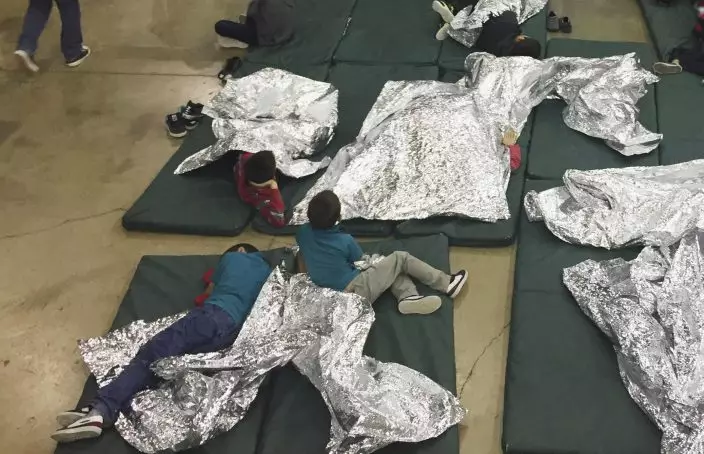Months after the Trump administration announced an end to its widescale separation of migrant parents and children, the policy remains a heated issue in the courts and at the border as critics contend the government is still needlessly breaking up immigrant families.
The Texas Civil Rights Project released a report Thursday that counts 272 separations at a single Texas courthouse since June, when President Donald Trump issued an executive order ending widespread separations amid public outrage.
The bulk of those cases involve children who cross the U.S.-Mexico border with relatives other than their parents, such as grandparents, uncles and aunts, or adult siblings.

FILE - In this June 17, 2018 file photo provided by U.S. Customs and Border Protection, people who've been taken into custody related to cases of illegal entry into the United States, rest in one of the cages at a facility in McAllen, Texas. Months after the Trump administration ended the general policy of separating parents and children, advocates and members of Congress are questioning the treatment of children who cross the U.S.-Mexico border with other relatives - grandparents, uncles and aunts, and adult siblings. (U.S. Customs and Border Protection's Rio Grande Valley Sector via AP, File)
Thirty-eight cases involved a parent or legal guardian, the majority of whom had criminal convictions, the group said.
In a statement, U.S. Customs and Border Protection argued the group incorrectly categorized cases involving other relatives because the Homeland Security Act "does not make concessions for anyone other than a parent or legal guardian." CBP includes the Border Patrol, which apprehends people entering the U.S. illegally.
The government and the American Civil Liberties Union were due back in court Thursday to discuss what might be thousands of children who were separated before a June court order requiring the speedy re-unification of families.
The government has acknowledged taking more than 2,700 children from their families and has reunited most of them, but a watchdog report last month found that thousands of other children were separated and released before the order.
"What's happening is the government is doing separations unilaterally without any process to contest the separations and without a child welfare expert overseeing the separations," ACLU lawyer Lee Gelernt said.
One concern, Gelernt and others said, is the fate of children cared for by relatives in arrangements that were never formalized.
In one case discovered by the Texas Civil Rights Project, an 11-year-old boy from Guatemala was separated from his uncle, who was his caretaker because his father had not been involved in his life and his mother had died of cancer, said Efren Olivares, a lawyer for the project.
"Those are very difficult situations, especially because the government takes the position that it is not their responsibility to reunite them because they are not the legal guardian," he said.
Lawyers from the project have gone almost every day since last spring to the courthouse in McAllen to find adults charged with illegally entering the U.S. and ask them if they had brought any children. McAllen is in South Texas' Rio Grande Valley, the busiest corridor for illegal border crossings.
U.S. immigration authorities say that under anti-trafficking law, children crossing the border without a parent or legal guardian must be processed as "unaccompanied," even if they are with an adult who isn't their parent or legal guardian.
"Absent verification that an adult is the parent or legal guardian of a minor, CBP will continue to prioritize the safety of a minor and comply with the statutory requirements," the agency said.
Unaccompanied children and teenagers from Central America are generally sent to government facilities, while the adults could face detention and prosecution for illegally entering the U.S. Authorities can also separate parents and children if it considers separation to be in the child's best interest, with a parent's criminal history often being a factor.
Gelernt said the government should work to determine if an adult relative is the child's caretaker.
"There can't be a presumption that you just take the child away if it's not the biological or adoptive parent," Gelernt said.
Members of Congress on Tuesday visited an emergency facility for migrant children in Homestead, Florida, which has expanded after the U.S. Department of Health and Human Services closed a facility in Tornillo, Texas, under public pressure.
U.S. Rep. Debbie Mucarsel-Powell, a Florida Democrat, said she had spoken to a girl who had been detained for nine months after being separated from her aunt. There were 1,575 children at the facility last week.
Another Florida Democrat, U.S. Rep. Donna Shalala, said the government's definition of an "unaccompanied minor" was too narrow and leads to unnecessary separations.
"If you don't come with a parent, but you come with an aunt, an uncle, a cousin, or a brother, you are defined as unaccompanied," said Shalala, a former health and human services secretary. "We need to get these children to family members much more quickly."
The government said in December it had separated 81 migrant children at the border since the June executive order. According to the government data, 197 adults and 139 minors were separated from April 19 through Sept. 30 because they were found to not be related, though that could include grandparents or other relatives if there was no proof of relationship.
The Health and Human Services Department's inspector general said last month that 118 children were separated from their parents from July 1 through Nov. 7.
Associated Press journalists Colleen Long in Washington and Adriana Gomez Licon and Josh Replogle in Miami contributed to this report.










